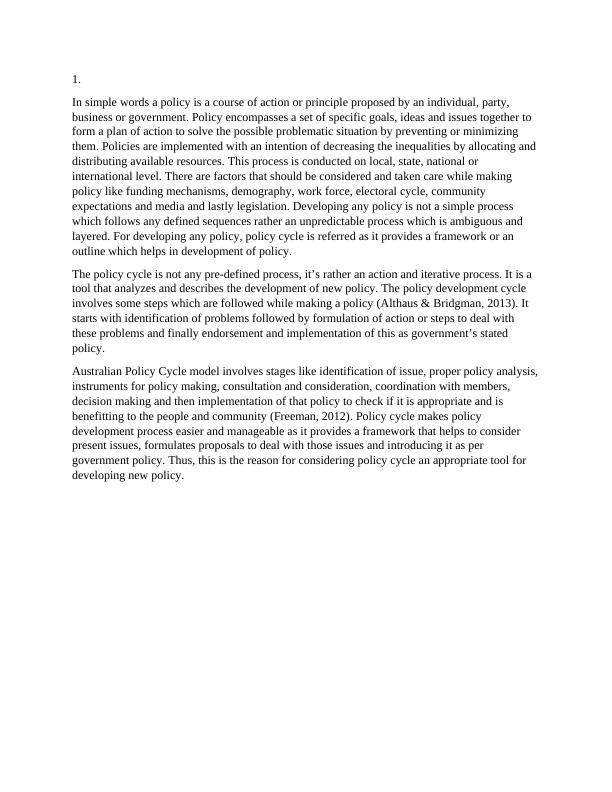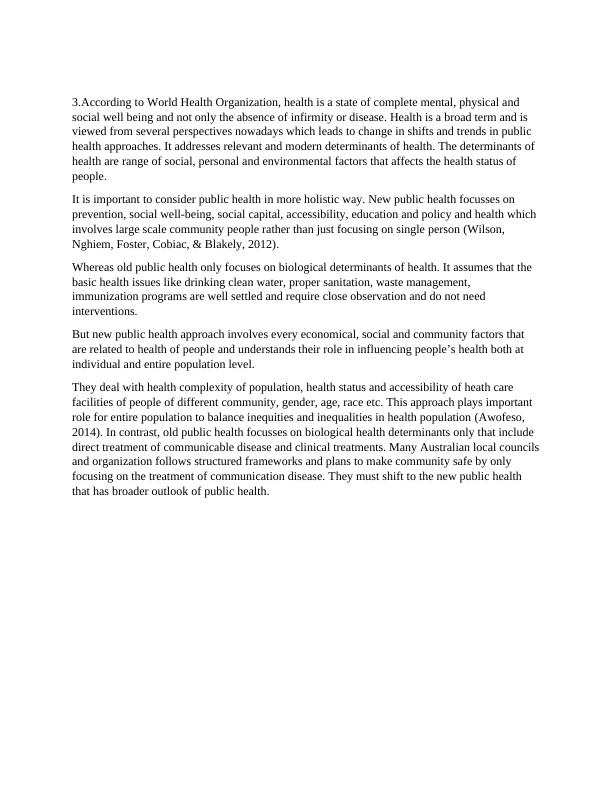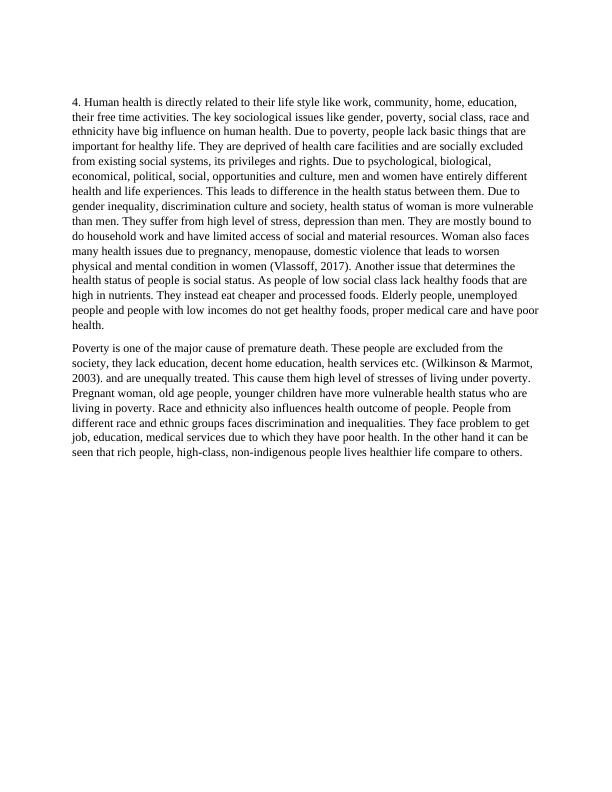Policy Cycle and its Importance in Developing New Policy
Added on 2023-06-13
6 Pages2064 Words56 Views
1.
In simple words a policy is a course of action or principle proposed by an individual, party,
business or government. Policy encompasses a set of specific goals, ideas and issues together to
form a plan of action to solve the possible problematic situation by preventing or minimizing
them. Policies are implemented with an intention of decreasing the inequalities by allocating and
distributing available resources. This process is conducted on local, state, national or
international level. There are factors that should be considered and taken care while making
policy like funding mechanisms, demography, work force, electoral cycle, community
expectations and media and lastly legislation. Developing any policy is not a simple process
which follows any defined sequences rather an unpredictable process which is ambiguous and
layered. For developing any policy, policy cycle is referred as it provides a framework or an
outline which helps in development of policy.
The policy cycle is not any pre-defined process, it’s rather an action and iterative process. It is a
tool that analyzes and describes the development of new policy. The policy development cycle
involves some steps which are followed while making a policy (Althaus & Bridgman, 2013). It
starts with identification of problems followed by formulation of action or steps to deal with
these problems and finally endorsement and implementation of this as government’s stated
policy.
Australian Policy Cycle model involves stages like identification of issue, proper policy analysis,
instruments for policy making, consultation and consideration, coordination with members,
decision making and then implementation of that policy to check if it is appropriate and is
benefitting to the people and community (Freeman, 2012). Policy cycle makes policy
development process easier and manageable as it provides a framework that helps to consider
present issues, formulates proposals to deal with those issues and introducing it as per
government policy. Thus, this is the reason for considering policy cycle an appropriate tool for
developing new policy.
In simple words a policy is a course of action or principle proposed by an individual, party,
business or government. Policy encompasses a set of specific goals, ideas and issues together to
form a plan of action to solve the possible problematic situation by preventing or minimizing
them. Policies are implemented with an intention of decreasing the inequalities by allocating and
distributing available resources. This process is conducted on local, state, national or
international level. There are factors that should be considered and taken care while making
policy like funding mechanisms, demography, work force, electoral cycle, community
expectations and media and lastly legislation. Developing any policy is not a simple process
which follows any defined sequences rather an unpredictable process which is ambiguous and
layered. For developing any policy, policy cycle is referred as it provides a framework or an
outline which helps in development of policy.
The policy cycle is not any pre-defined process, it’s rather an action and iterative process. It is a
tool that analyzes and describes the development of new policy. The policy development cycle
involves some steps which are followed while making a policy (Althaus & Bridgman, 2013). It
starts with identification of problems followed by formulation of action or steps to deal with
these problems and finally endorsement and implementation of this as government’s stated
policy.
Australian Policy Cycle model involves stages like identification of issue, proper policy analysis,
instruments for policy making, consultation and consideration, coordination with members,
decision making and then implementation of that policy to check if it is appropriate and is
benefitting to the people and community (Freeman, 2012). Policy cycle makes policy
development process easier and manageable as it provides a framework that helps to consider
present issues, formulates proposals to deal with those issues and introducing it as per
government policy. Thus, this is the reason for considering policy cycle an appropriate tool for
developing new policy.

3.According to World Health Organization, health is a state of complete mental, physical and
social well being and not only the absence of infirmity or disease. Health is a broad term and is
viewed from several perspectives nowadays which leads to change in shifts and trends in public
health approaches. It addresses relevant and modern determinants of health. The determinants of
health are range of social, personal and environmental factors that affects the health status of
people.
It is important to consider public health in more holistic way. New public health focusses on
prevention, social well-being, social capital, accessibility, education and policy and health which
involves large scale community people rather than just focusing on single person (Wilson,
Nghiem, Foster, Cobiac, & Blakely, 2012).
Whereas old public health only focuses on biological determinants of health. It assumes that the
basic health issues like drinking clean water, proper sanitation, waste management,
immunization programs are well settled and require close observation and do not need
interventions.
But new public health approach involves every economical, social and community factors that
are related to health of people and understands their role in influencing people’s health both at
individual and entire population level.
They deal with health complexity of population, health status and accessibility of heath care
facilities of people of different community, gender, age, race etc. This approach plays important
role for entire population to balance inequities and inequalities in health population (Awofeso,
2014). In contrast, old public health focusses on biological health determinants only that include
direct treatment of communicable disease and clinical treatments. Many Australian local councils
and organization follows structured frameworks and plans to make community safe by only
focusing on the treatment of communication disease. They must shift to the new public health
that has broader outlook of public health.
social well being and not only the absence of infirmity or disease. Health is a broad term and is
viewed from several perspectives nowadays which leads to change in shifts and trends in public
health approaches. It addresses relevant and modern determinants of health. The determinants of
health are range of social, personal and environmental factors that affects the health status of
people.
It is important to consider public health in more holistic way. New public health focusses on
prevention, social well-being, social capital, accessibility, education and policy and health which
involves large scale community people rather than just focusing on single person (Wilson,
Nghiem, Foster, Cobiac, & Blakely, 2012).
Whereas old public health only focuses on biological determinants of health. It assumes that the
basic health issues like drinking clean water, proper sanitation, waste management,
immunization programs are well settled and require close observation and do not need
interventions.
But new public health approach involves every economical, social and community factors that
are related to health of people and understands their role in influencing people’s health both at
individual and entire population level.
They deal with health complexity of population, health status and accessibility of heath care
facilities of people of different community, gender, age, race etc. This approach plays important
role for entire population to balance inequities and inequalities in health population (Awofeso,
2014). In contrast, old public health focusses on biological health determinants only that include
direct treatment of communicable disease and clinical treatments. Many Australian local councils
and organization follows structured frameworks and plans to make community safe by only
focusing on the treatment of communication disease. They must shift to the new public health
that has broader outlook of public health.

4. Human health is directly related to their life style like work, community, home, education,
their free time activities. The key sociological issues like gender, poverty, social class, race and
ethnicity have big influence on human health. Due to poverty, people lack basic things that are
important for healthy life. They are deprived of health care facilities and are socially excluded
from existing social systems, its privileges and rights. Due to psychological, biological,
economical, political, social, opportunities and culture, men and women have entirely different
health and life experiences. This leads to difference in the health status between them. Due to
gender inequality, discrimination culture and society, health status of woman is more vulnerable
than men. They suffer from high level of stress, depression than men. They are mostly bound to
do household work and have limited access of social and material resources. Woman also faces
many health issues due to pregnancy, menopause, domestic violence that leads to worsen
physical and mental condition in women (Vlassoff, 2017). Another issue that determines the
health status of people is social status. As people of low social class lack healthy foods that are
high in nutrients. They instead eat cheaper and processed foods. Elderly people, unemployed
people and people with low incomes do not get healthy foods, proper medical care and have poor
health.
Poverty is one of the major cause of premature death. These people are excluded from the
society, they lack education, decent home education, health services etc. (Wilkinson & Marmot,
2003). and are unequally treated. This cause them high level of stresses of living under poverty.
Pregnant woman, old age people, younger children have more vulnerable health status who are
living in poverty. Race and ethnicity also influences health outcome of people. People from
different race and ethnic groups faces discrimination and inequalities. They face problem to get
job, education, medical services due to which they have poor health. In the other hand it can be
seen that rich people, high-class, non-indigenous people lives healthier life compare to others.
their free time activities. The key sociological issues like gender, poverty, social class, race and
ethnicity have big influence on human health. Due to poverty, people lack basic things that are
important for healthy life. They are deprived of health care facilities and are socially excluded
from existing social systems, its privileges and rights. Due to psychological, biological,
economical, political, social, opportunities and culture, men and women have entirely different
health and life experiences. This leads to difference in the health status between them. Due to
gender inequality, discrimination culture and society, health status of woman is more vulnerable
than men. They suffer from high level of stress, depression than men. They are mostly bound to
do household work and have limited access of social and material resources. Woman also faces
many health issues due to pregnancy, menopause, domestic violence that leads to worsen
physical and mental condition in women (Vlassoff, 2017). Another issue that determines the
health status of people is social status. As people of low social class lack healthy foods that are
high in nutrients. They instead eat cheaper and processed foods. Elderly people, unemployed
people and people with low incomes do not get healthy foods, proper medical care and have poor
health.
Poverty is one of the major cause of premature death. These people are excluded from the
society, they lack education, decent home education, health services etc. (Wilkinson & Marmot,
2003). and are unequally treated. This cause them high level of stresses of living under poverty.
Pregnant woman, old age people, younger children have more vulnerable health status who are
living in poverty. Race and ethnicity also influences health outcome of people. People from
different race and ethnic groups faces discrimination and inequalities. They face problem to get
job, education, medical services due to which they have poor health. In the other hand it can be
seen that rich people, high-class, non-indigenous people lives healthier life compare to others.

End of preview
Want to access all the pages? Upload your documents or become a member.
Related Documents
Policy Evaluation in Public Healthlg...
|10
|3489
|113
Policy, Power and Politics in Health Care Provisionlg...
|11
|3070
|387
Health Science Assignment | Policy Cyclelg...
|8
|2727
|195
Public Health and Policy - Assignmentlg...
|9
|2391
|326
Policy, Power & Politics in Health Care Provisionlg...
|7
|2641
|50
Developing Social Policylg...
|10
|2257
|203
